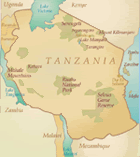I am in the US on “home leave”.
When I tell random strangers in America that I live in Tanzania I often get back a look that has now become familiar. It is actually more of a question than a look. The question is, “That girl, she lives in a hut?”
Just a few days ago I was at the bank in my childhood home of Larchmont, NY trying to explain to a teller why I needed to get a new ATM card early (my current one expires in 6 months). I told her that because I live overseas, in Africa, it will be difficult to get me my new one without a lot of headache (and since I don’t have a bank account there I am entirely dependant on the card). The teller and other people working behind the counter – and even some of my fellow clients - immediately began to pepper me with questions about my life there.
In particular, people always ask me about the amenities. On this day, the staff and clients of Bank of America couldn’t believe that I have a house not all that different than a house in Larchmont (ok, slight exaggeration – but when the water and electricity are working that is essentially true). They couldn’t believe that I live in a suburb that has much in common with Larchmont (again an exaggeration – but Larchmont has overpriced restaurants and supermarkets and one single movie theatre – just like in Dar).
I assured them that I do not live in a hut, I have indoor plumbing (five bathrooms on my property, actually), and my life is comfortable and mostly secure.
These revelations always blow them away. And I leave these discussions feeling a wee bit superior, patting myself on my back for having done my public service for the day – like I’m a walking Schoolhouse Rocks.
But actually… perhaps I am really doing them a disservice? What do I really want them to believe about Africa and my life there?
How can I explain the conundrum of the life I lead as a rich person in one of the poorest nations on earth without sounding smug or insensitive? How can I make them understand that if I had to live in a hut, I wouldn’t be there either? How can I explain that I want to make a difference, but not at the expense of too many of the creature comforts I’ve also worked hard to be able to afford myself?
Even writing this makes me feel trite. It is the clash of my development guilt vs. my inner JAP.
In my thesaurus search for words to describe the incongruity of my life as an American in Tanzania I come up with: paradox, disagreement, opposition, inconsistency, ambiguity, and conflict.
In truth I feel all of these feelings more profoundly when I’m back in America – when I am forced to explain how I live and what I am doing. When I’m in Tanzania, it all seems quite natural. I’m surrounded by people of all nationalities living the same way as me – in our bubble on the Peninsula.
In Tanzania, if you let it all in, you go crazy. I’ve seen it happen to many people.- and when it does, they can’t survive there. They had to go home, back to the West, where they can dial up or down the amount of global suffering they let in based upon how much international news they watch or whether the gossip magazines are covering a story about Angelina Jolie’s lasted humanitarian jaunt. Re-reading this paragraph I sound kind of snarky. I don’t mean to. I totally understand it. It could easily be me – especially if I wasn’t distracted by work
But I don’t want to go home yet. Or rather, since I feel at home in Tanzania, I’m not ready to leave my home of the last 3+ years. Not yet.
At the bank they also asked me when I plan to come back to America. That seems to be the most frequent question I get when I’m on leave – and not just from my mother. When I tell strangers and friends that I’m not sure when I’ll be done overseas they go sort of glassy-eyed. I don’t know what my exit-plan is. I know it will come – but just not yet.
I guess I am ok living in a state of ambiguity. I’ve become talented at dealing with the paradox - good enough that the guilt and the complete lack of fairness and equity in this world doesn’t hit me as hard as it probably should until I’m actually outside of Tanzania.
This is certainly nothing to be proud of. But it is how I have survived and thrived.
 My house, not long after we moved in. It is nicely landscaped now.
My house, not long after we moved in. It is nicely landscaped now.







 Jaden and Rowan
Jaden and Rowan






